After two experimental projects in the face of the cooperative Dragon Quest IX and the fully online DQX, which united hundreds of thousands of gamers in one universe, the series returned to the classical mainstream and continues to go in the forefront of the genre, not changing its principles laid down decades ago.
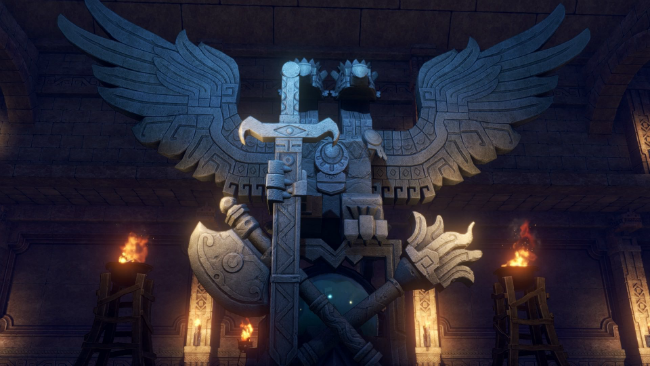
The newest chapter of the franchise, Dragon Quest XI: Echoes of an Elusive Age, brings us back to the cozy home of the classic single-player jRPG. A moment more suitable than ever – now is the time to declare a return to the roots, looking at the renaissance of the genre and Japanese games in particular.
From the very beginning, the eleventh part of the star series sets the pace for the whole story. Noting how thoroughly the introduction with the luxurious screensavers is done and how verified the narrative should be ahead, the feeling that we are reading a real fairy-tale novel immediately appears. And sweet reports from the mouth of the narrator about the events at each return to the game only reinforce the effect.
Having introduced us to the protagonist, the game plunges into a chain of events, where the main character is assigned the mission of expelling darkness. Simple at first glance, the story is much more complicated than it seems at the very beginning. The character becomes a hostage situation, which will give impetus to a grand adventure with unique characters and unexpected discoveries.
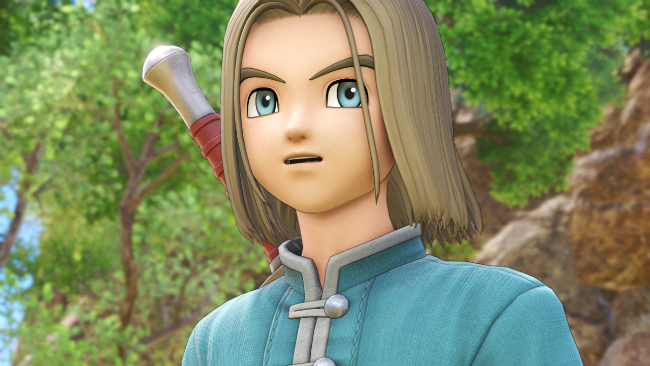
In total, there are eight playable characters in the game, including the main character – the jack of all trades, the sisters Veronica and Serena – skillful sorceresses, the thief Erik, the wandering actor Silvando, the old Raba, the martial arts master Jade, and another unexpected character who will join later.
All the characters are charismatic and at first conceal the riddle of the personality, which reinforces the desire to go further and understand what motivates them and who they really are. Backstory turned out to be surprisingly topical, including the main character. Wait for some strong emotional moments.
In the middle, the game is divided into story arches within certain cities, which leads to qualitative inconsistency in the plot aspect. As a result, in one city we can get a great intriguing plot with emotional scenes, and in the other, it can completely contradict the given atmosphere and cast doubt on the logic of the story.
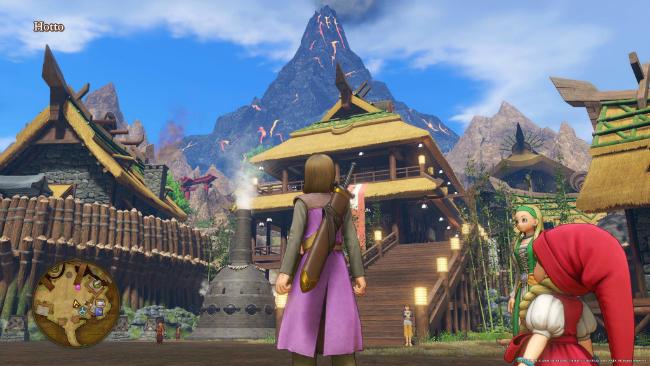
The beauty of Dragon Quest – in countless little things, which clearly distinguish the series from the rest. Even taking into account the fact that the game is linear, it competently increases gameplay features and gradually delivers the plot.
The narrative is structured in such a way that all global goals are broken down into small tasks, fulfilling which we learn new bits of history and get rewards at the completion of each. In the second half of the game, the plot turns become so large that you constantly catch yourself thinking about how sensibly the situation gets.
A scrupulous approach here is applied to literally everything, thanks to which the game completely immerses into a thick fairy-tale atmosphere. You get the support of a new party member, get new information on the quest and the world, at the same time studying new game mechanics, as well as ways to interact with other team members. Looking around every corner in the premises, you can not only stumble on the owners’ underwear, but also learn about the features of the region, famous events, monsters, or just get new recipes for crafting.
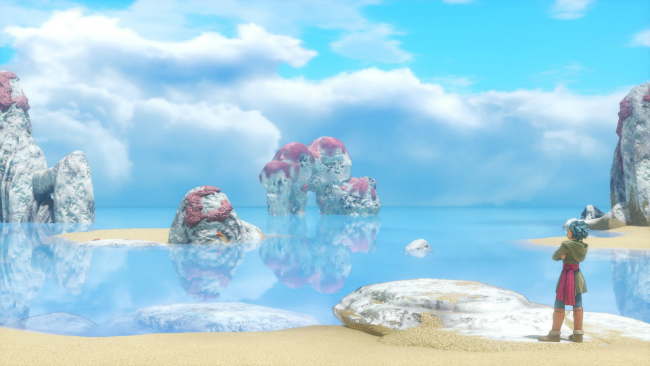
The world of Erdrei is deeply developed and with all its heterogeneity of inhabitants, it feels whole. Locations are unique and divided by subject, which sets the tone for the appearance of residents, their behavior and such details as the accent and manner of conducting a conversation. Townspeople range from a British cockney accent to Italian dandies in local Venice and even haiku poems. Some settlements are like real cities, others are pure fantasy fiction, like the atmospheric realm of mermaids.
Exploring the world – a very important element of the gameplay. By land, you are free to travel on your own, or using a horse. On the water, you become the captain of the ship. For convenience, the developers quite quickly introduce familiar Zoom and Evac teleportation spells, allowing you to instantly move around and motivating you to make new discoveries. And in specially designated places, you can ride the monster highlighted in a special way and open up the way to difficult areas of locations.
In addition, in the game appeared autosave. At the same time, you can still be saved manually in specially designated places – in the churches of the settlements and near the statues scattered in all locations.
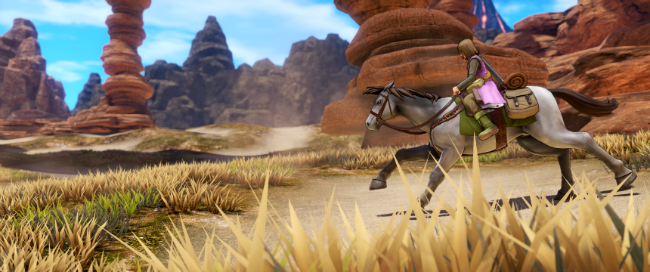
At a basic level of complexity, DQXI was very affordable and constantly encourages the player. To pass the storyline with a thorough approach to party management, dressing heroes in high-quality equipment and sensibly distributing roles, as well as discovering the most useful abilities for the chosen path of development, you can get through the game almost without grind, only killing the monsters that appear on the way.
Hardcore fans did not stand aside. For those who want to challenge, from the very beginning developers have added the ability to select special modifiers that complicate the passage.
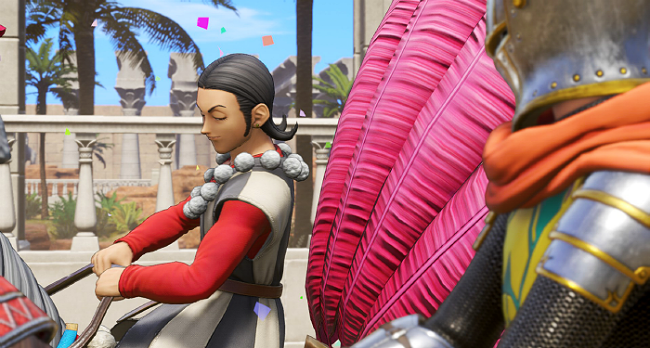
The game welcomes a much more fascinating method of obtaining equipment than a simple farm loot with gold. The marching smithy will allow you to craft all types of uniforms, from weapons to accessories, in the form of a short but entertaining mini-game to get the necessary temperature for forging. When you reach the required values, you get a better quality item, and the more times you hit the bull’s eye, the better the result. Things in the title acquire an inscription from the basic bonus +1 to the maximum perfection of +3, if the forging went particularly well. A similar system was used in some other games, however, not only the main but also additional attributes are increased here. Also, as a reward for the successful craft of a piece of equipment, pearls of excellence are issued, which are used to try to improve an existing item. if he has not yet reached the perfection level of +3. Thus, instead of spending resources on trying to recreate an item better than the first, you can save money and use pearls, which is especially good if you need to improve an item for which very rare resources were needed. Do not worry if your blacksmith’s level is small and concentration points are not enough for a successful forging, in the worst case you will get a standard version of the item without bonuses and a reward in the form of pearls, which can always be improved in the future with these pearls simple items earlier. It is impossible to break an item, so nothing will be wasted. Considering the fact that the range of purchased items is limited, and the things created are often better than store items,
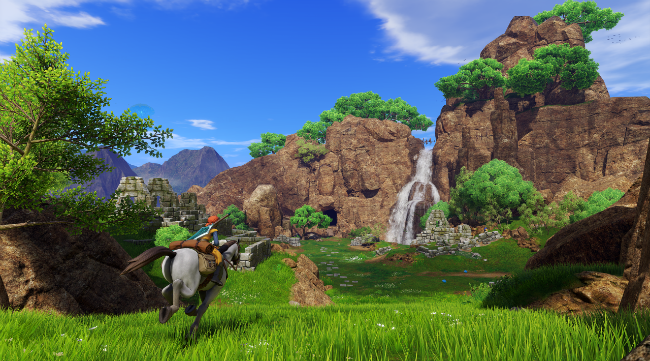
A nice bonus here is also that all weapons have unique three-dimensional models, and the armor, although different from each other only when using unique sets, is enough of them here – there is something to choose from.
The combat system turned out to be very dynamic for step-by-step jRPGs, but it is very important to choose the classic combat camera as an option. The pumping system in this part is more transparent and free compared to Dragon Quest VIII. As before, attributes are distributed automatically, each character has its own predisposition, someone will gradually become more agile, someone stronger, while others will get better and better bonuses to magic. And according to the tradition of the series, all these parameters can be balanced with the help of seeds of attributes that you will find all over the world. The most stubborn players, if desired, will be able to bring these attributes to a value of 999, since each of the seeds can be found in monsters in the later stages of the game. Now the characters have a visual table of skills for which you will spend skill points, which are issued in a fixed amount per level. These skills allow you to adapt to different situations, diluting the pros and cons of each character. However, especially strong blocked and open only when pumping certain skills around him.
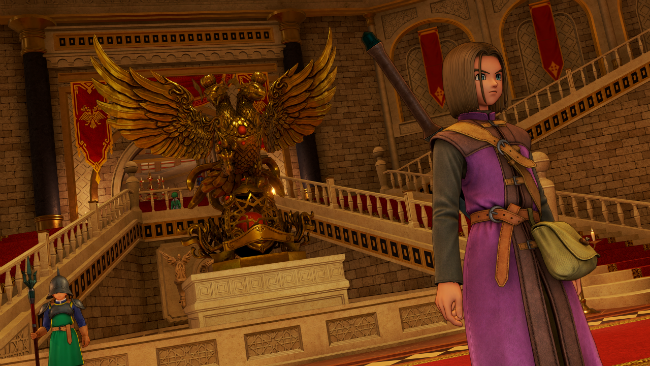
In addition to this, the local analog of the ultimatum techniques is “Pep-skills”, which open in the course of passing and pumping. Accompanied by colorful animations, they are activated depending on the presence in the party of the necessary characters to perform them and play both the role of buffs, debuffs and attacking skills. However, so that life is not too sweet, opponents, including bosses, can also use “Pep-skills”. Most of all it is worth being afraid of moments when several opponents enter this state at a time, because they are also capable of conducting particularly destructive joint Pep attacks.
Heroes can be controlled either directly, manually giving commands, or putting them at the mercy of the AI, choosing the desired fighting style. The artificial intelligence of his partners makes rather balanced decisions, but when it comes to fighting in unequal conditions, he starts to make mistakes, since human improvisation is necessary here. Therefore, it is unlikely that you will be able to go through DQXI on autobah, especially on higher difficulty, it is recommended to control every fight manually.
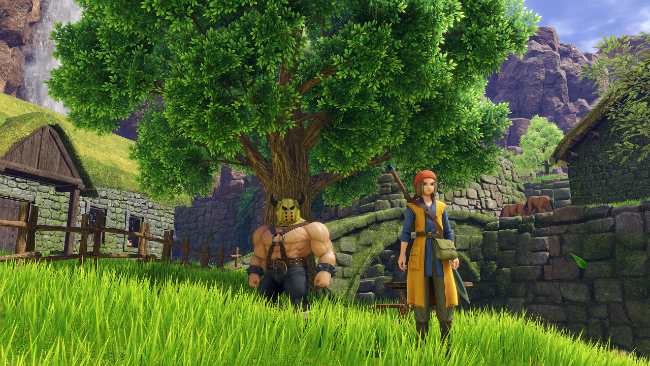
With rare exceptions, battles in the game take place directly during contact with the enemy on the location map. The motley representatives of the fauna are one and all drawn by the permanent artist Akira Toriya and are recognized instantly. Detailed to the smallest patchwork and amusingly animated models pleasantly complement the fantastic atmosphere of Erdrea.
There are a total of 24 bosses at DQXI , each of which requires a different approach. So, some have a full magical protection, eliminating the use of wizards. Others may abuse abusive or weakening spells, for the removal of which are responsible for different characters.
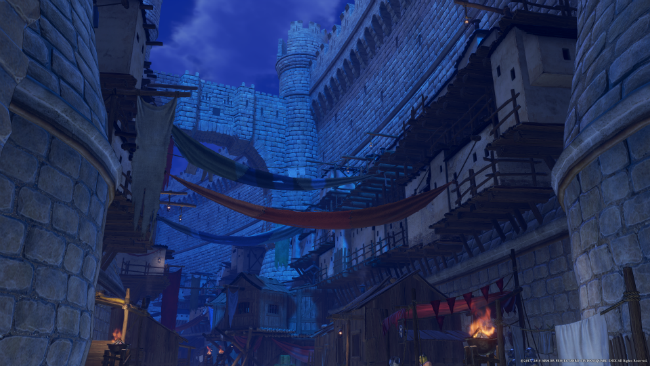
Proper distribution of roles, given the inherent characteristics of the characters, becomes a very important point, especially at the end of the game, when you have a tank character who will not be easy to cope with all incoming damage, especially magic. But this allows the weaker members of the party to survive.
Keeping alive the most necessary hero is very important with the bosses after the passage of the plot – especially at times when powerful enemies perform actions for several moves at a time at a time while you are doing one for each hero. Therefore, your squad must act as a single coordinated mechanism.
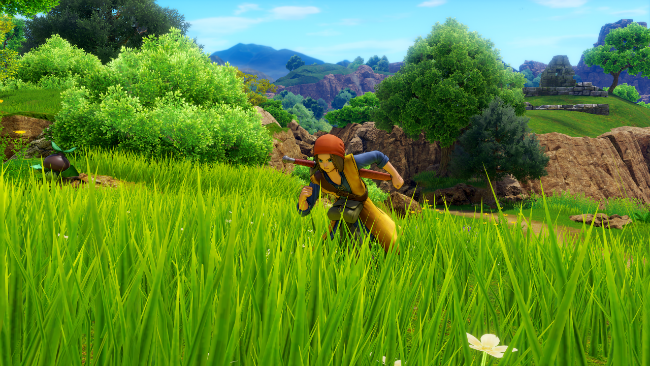
It is equally important to take advantage of passive equipment skills. So, some give protection up to 50% to negative statuses, including instant death.
We’ll have to use the entire arsenal of knowledge, because bosses are more often ordinary monsters use the so-called “desperate” attacks, breaking through the defense and inflicting critical high damage, sometimes costing several characters. Some are able to force the hero to skip the course, others call on the minions or carry out a combination of techniques to which one of the heroes is weak, destroying him during the course.
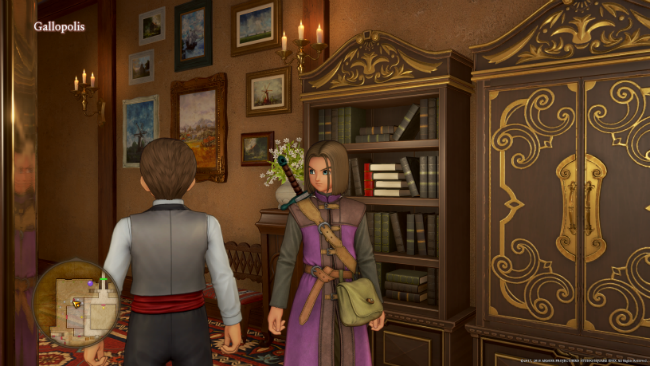
The developers tried to diversify the majority of boss fights and they turned out to be deep and interesting. Here it is very important to use weakening abilities, which in many other jRPGs usually work only on standard opponents.
Thinking through tactics, numerous trivialities and the general mood, including the gamut of the game, are tuned to such a thoughtfully positive way that, immersed in DQXI, you may not notice how time goes by.
Even side quests, most of which are typical of the genre, support your interest. With what ecstasy the people tell their sentimental stories! This is the case when not only things and gold act as a reward, but also the opportunity to laugh heartily and learn some interesting facts about the game world.
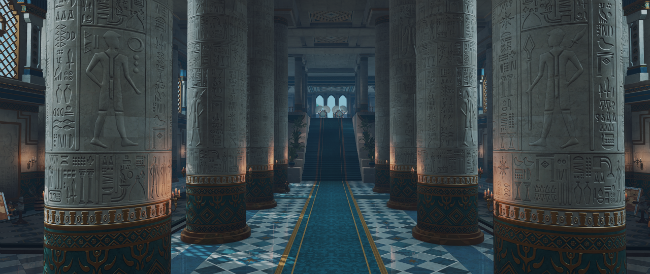
What is especially cool in all quests, including storyline, is how organically the stories of secondary characters are woven into the narrative, whether it is receiving honors from another important person, horse racing or martial arts competition.
The presence of numerous references to the past games of the series is also pleasant – from the tree of Yggdrasil standing in the center of the plot, islands in the sky and the sword of light made in the same design as the Lotto blade from DQ I / II / III to the task of collecting six familiar spheres , some bosses, familiar NPCs from the Academy of Medals and more.
If you want to distract yourself, then apart from collecting medals, the usual casino with poker and slot machines, horse racing and the destruction of targets from a crossbow appeared in Dragon Quest XI. The battle tests of “Wheels of Harm” stand out in isolation, the latter of which require a high level and good equipment.
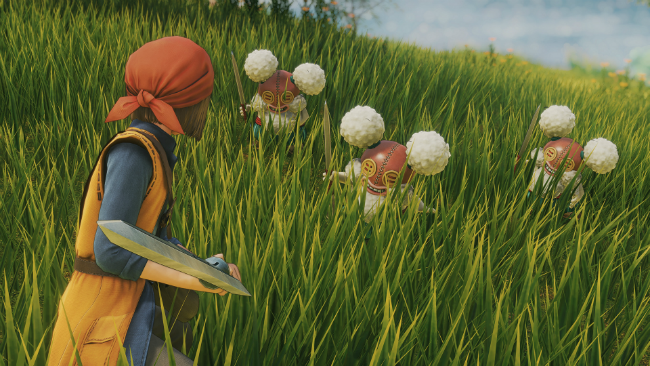
I would like to praise the localization of the project, performed at the highest level. Characters speak typical English with specific accents and intonations based on their characters and origin. And, of course, humor, which was carefully transferred, including sexist jokes and in places pure Japanese gags.
The music in something pleased, but in something disappointed. The soundtrack is very beautiful and atmospheric, but it definitely lacks diversity. Some topics are very boring, like a melody, playing while moving around the locations. Considering the presence of pleasant arrangements of old tracks that awaken nostalgia, the composer could still try to write in addition to more new themes for the presence of the necessary variability.
The game looks great, delighting with a bright style, beautiful character models, lights and other effects of the Unreal Engine 4. It’s nice that the authors of the game did not use classic cel-shading, but combined it with realistic textures and three-dimensional effects.
Praise deserves the study of locations and premises. In buildings, a huge number of various painstakingly created objects – I want to touch everything. Entering the royal castle, you feel the grandeur of the family, watching the decoration of the rooms, their filling and beautifully painted reliefs on the walls, numerous arches, columns, and other architectural objects.